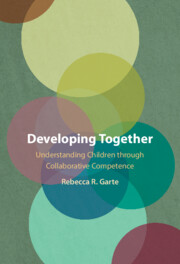Book contents
- Developing Together
- Developing Together
- Copyright page
- Dedication
- Contents
- Figures
- Tables
- Preface
- Acknowledgments
- Part I Collaborative Competence
- Chapter 1 Why a New Direction Is Necessary
- Chapter 2 Can the Self Be Relational?
- Part II Elements of Collaborative Competence
- Part III A New Theory and Method for Assessing Development via Collaborative Competence
- Part IV Implications for Theory, Research, and Practice
- References
- Index
Chapter 2 - Can the Self Be Relational?
Culture at the Root of Psychology
from Part I - Collaborative Competence
Published online by Cambridge University Press: 07 May 2024
- Developing Together
- Developing Together
- Copyright page
- Dedication
- Contents
- Figures
- Tables
- Preface
- Acknowledgments
- Part I Collaborative Competence
- Chapter 1 Why a New Direction Is Necessary
- Chapter 2 Can the Self Be Relational?
- Part II Elements of Collaborative Competence
- Part III A New Theory and Method for Assessing Development via Collaborative Competence
- Part IV Implications for Theory, Research, and Practice
- References
- Index
Summary
This chapter elaborates on why an exclusive focus on the individual within psychology cannot be culturally valid for all children. Contrasting Western individualistic goals for child-rearing and development with the more collectivistic goals and orientations of the majority world, this chapter shows that foundational assumptions regarding the nature of subjectivity differ by culture. Three specific components of the interdependent approach to child development as demonstrated by African, Latin American, Indigenous, and Asian societies are examined in depth. These themes include a holistic view of development, intelligence as a form of social responsibility, and children as apprentices. Together, these themes characterize child development processes within the majority world. Research shows that societies that consider a socially contingent self as the ideal outcome for development might be more likely to support collaborative competence. Overall, the literature reviewed suggests that Western conceptions of subjectivity and therefore intersubjectivity do not extend to all cultures. In addition, collaborative competence highlights the strengths of minoritized children in the US while supporting all children’s development.
Keywords
- Type
- Chapter
- Information
- Developing TogetherUnderstanding Children through Collaborative Competence, pp. 26 - 44Publisher: Cambridge University PressPrint publication year: 2024

